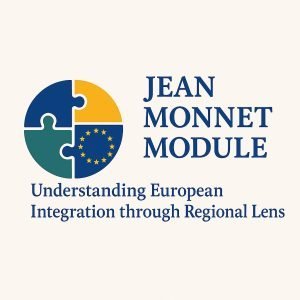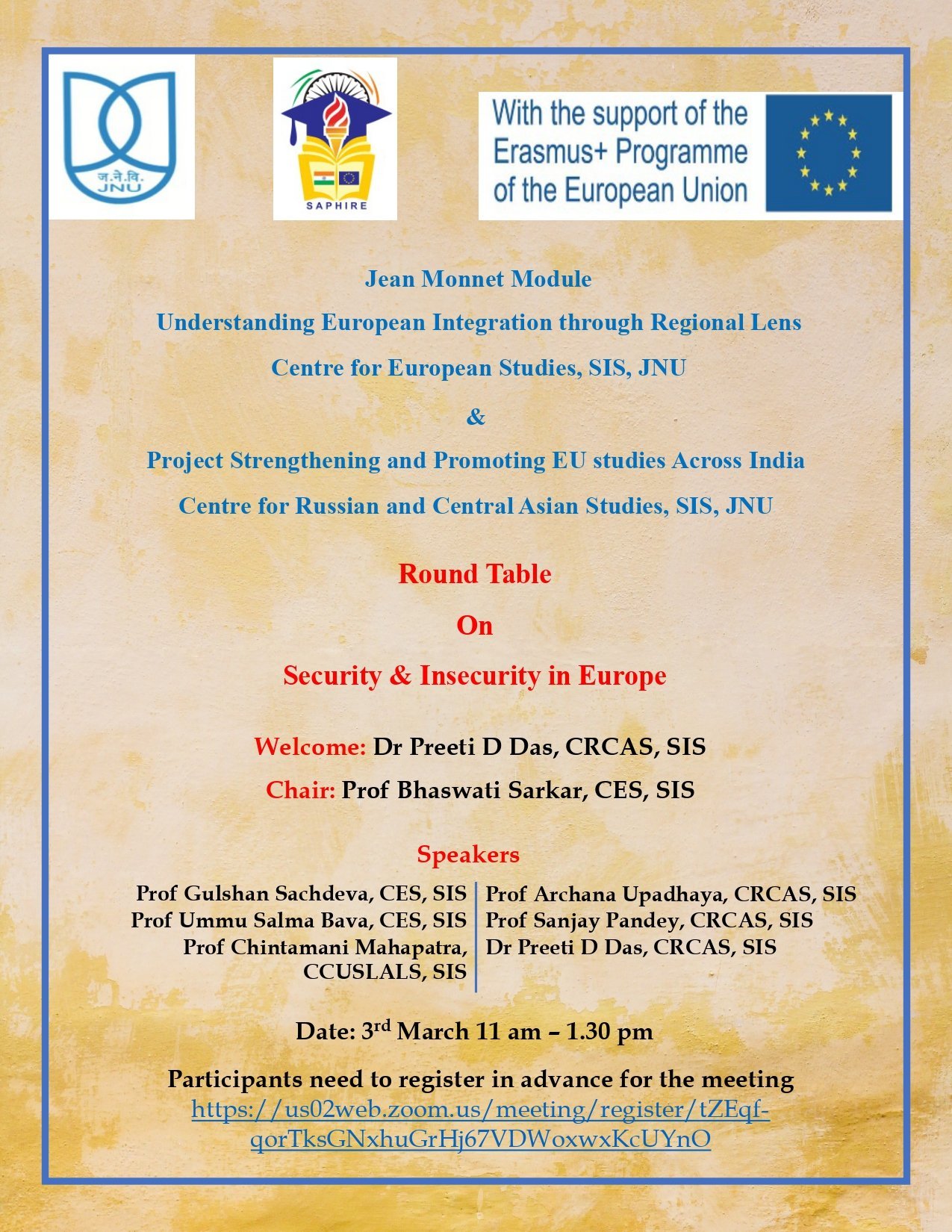
- This event has passed.
Round Table – “Security and Insecurity in Europe”


Event Report
A roundtable talk on “Security and Insecurity in Europe”, was organized by the Jean Monnet Module Understanding European Integration Through the Regional Lens and the Centre for European Studies and Project Strengthening and Promoting EU Studies Across India and the Centre for Russian and Central Asian Studies, SIS, JNU in the School of International Studies, Jawaharlal Nehru University on 3rd March 2022.
The roundtable was chaired by Prof. Bhaswati Sarkar, and Prof. Preeti Das from the Centre for Russian and Central Asian Studies (CRCAS) gave a welcome address. The speakers at the conference were Prof Gulshan Sachdeva, CES, SIS; Prof Ummu Salma Bava, CES, SIS; Prof Chintamani Mahapatra, CCUSLALS, SIS; Prof Archana Upadhaya, CRCAS, SIS; Prof Sanjay Pandey, CRCAS, SIS and Dr Preeti D Das, CRCAS, SIS.
With the ever-changing nature of world politics, the security landscape of nations worldwide undergoes dynamic change, too. With Europe, we have seen that it has undergone vital changes in its security landscape since the dawn of the 20th Century. Europe has historically been a region of relative stability and prosperity, yet it faces a dynamic security landscape characterized by internal and external challenges. This roundtable focused on the key dimensions of security and insecurity in Europe, focusing on political, economic, military, and societal aspects. The speakers from the European Center, American Center, and Russian Studies Center highlighted security issues from all three perspectives.
Europe’s security landscape is a mosaic shaped by centuries of conflict, cooperation, and adaptation to global dynamics. Anchored by multilateral institutions like the European Union (EU) and NATO, the continent enjoys substantial stability. However, challenges such as geopolitical rivalries, internal divisions, and emerging threats like cyberattacks and climate change create persistent insecurities.
The speakers focused on the dimensions of Security in Europe as Europe’s security architecture heavily relies on multilateral institutions such as NATO which as the primary military alliance, ensures collective defense and serves as a deterrent against external aggressors. Its Article 5 commitment—where an attack on one is considered an attack on all—reinforces member states’ security. The EU further enhances security through political integration, economic cooperation, and initiatives like the Common Security and Defense Policy (CSDP). Mechanisms such as the European Defence Fund promote defense innovation and joint procurement, and OSCE (Organization for Security and Co-operation in Europe) focuses on conflict prevention, crisis management, and post-conflict rehabilitation.
The backdrop of the roundtable was the Russian attack on Ukraine; the speakers focused on how the war has highlighted the vulnerabilities in Europe, further heightened by hybrid threats like cyberattacks, disinformation, and energy supply manipulation. And internally, the rise of populism and nationalism in countries like Hungary and Poland subverts EU cohesion by challenging democratic norms and collective policies. Furthermore, economic vulnerabilities remain stark, with Europe’s energy dependency on Russia before the Ukraine war highlighting risks, even as diversification efforts progress. Post-pandemic economic disparities have also fueled social unrest and political instability. Emerging threats like cyberattacks, climate change, and unresolved migration crises compound these insecurities, straining infrastructure, social systems, and political unity. Despite these challenges, Europe has responded with strategies to strengthen defense, diversify energy sources, and reinforce democratic resilience. NATO modernization, the EU’s Strategic Compass, and renewable energy initiatives with partners like Norway are critical steps forward. Similarly, cybersecurity frameworks and migration reforms aim to address newer challenges while climate adaptation measures seek long-term stability. The Ukraine war encapsulates Europe’s dual realities of insecurity and resilience, highlighting the need for credible deterrence, reduced reliance on authoritarian regimes, and enhanced multilateral cooperation. By addressing these interconnected challenges through cohesive strategies, Europe can bolster its security and adaptability in an increasingly uncertain world.
Europe’s security landscape reflects a complex mix of strengths and vulnerabilities. Geopolitical rivalries, internal divisions, and emerging threats demand constant vigilance and require strong institutions, economic integration, and crisis resilience to form the bedrock of stability. To address these challenges requires a comprehensive strategy rooted in unity, adaptability, and forward-looking policies. Only by strengthening its internal cohesion and global partnerships can Europe ensure lasting security in an increasingly uncertain world.
